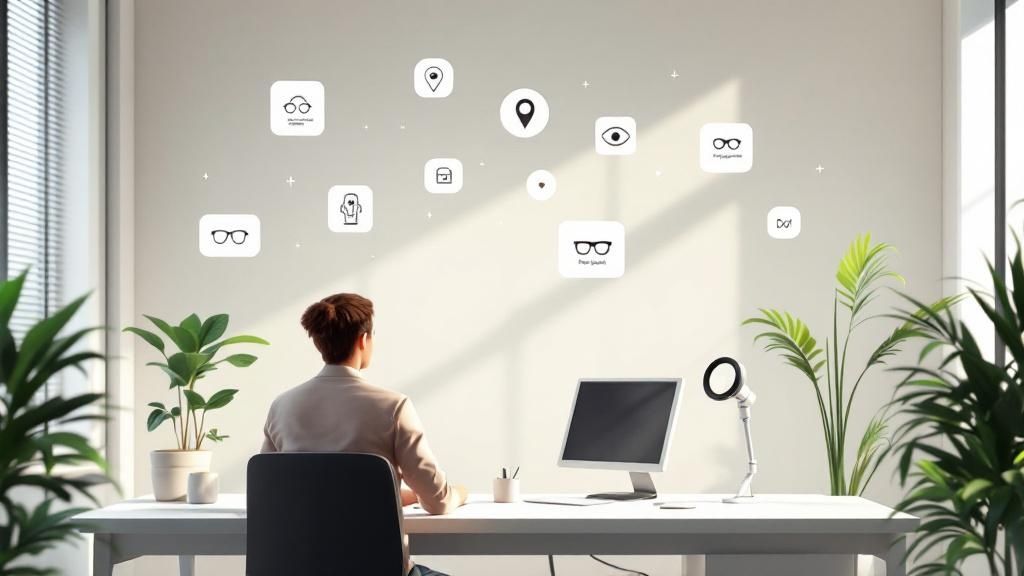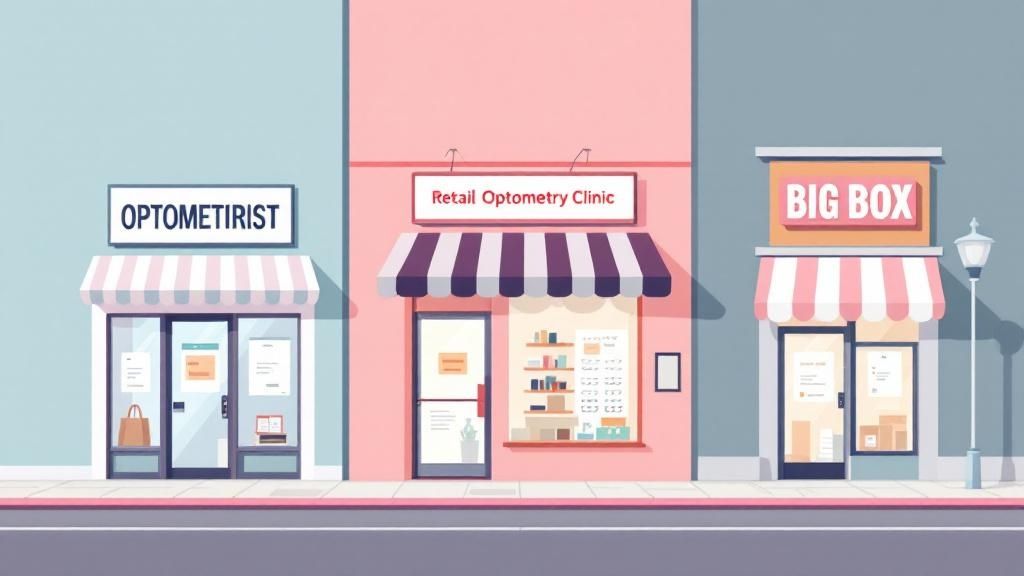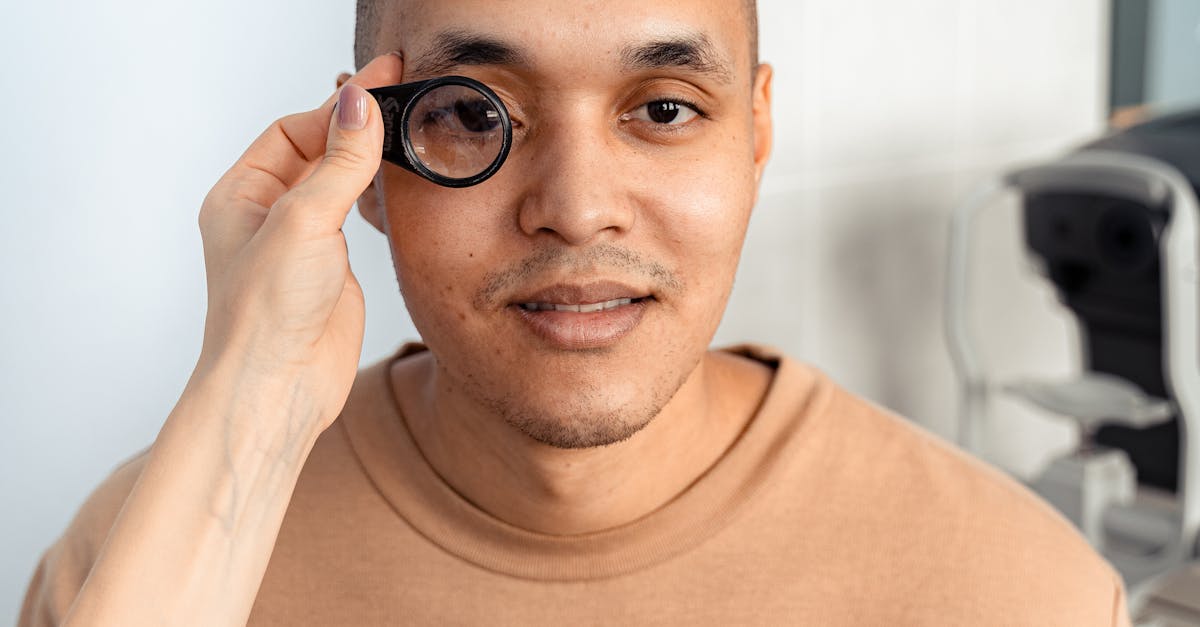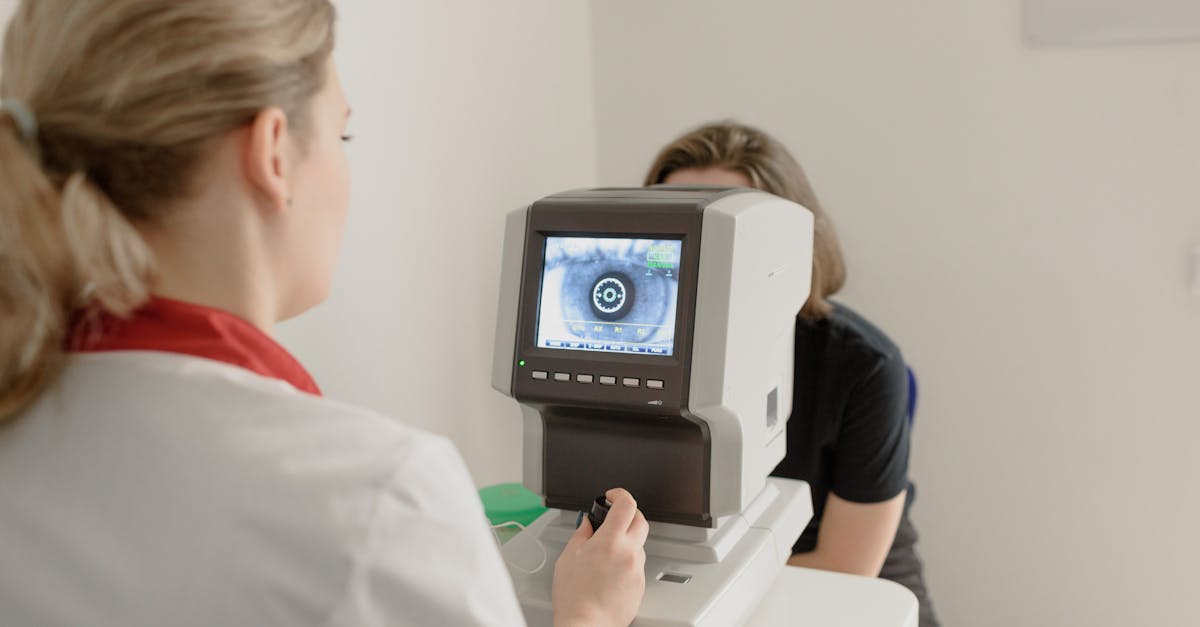Trying to figure out healthcare costs without insurance can be a headache, especially when it comes to something as crucial as your eyesight. If you're looking for an eye exam in Glendale Heights, you can generally expect the eye exam cost without insurance to fall somewhere between $75 and over $250. What you actually end up paying really depends on how in-depth the exam needs to be, which is what this guide is all about.
Your Guide to Eye Exam Costs in Glendale Heights
When you don't have a vision plan, getting a straight answer on eye exam costs can feel like trying to solve a puzzle. But that price tag isn't just a random number. It’s a direct reflection of the level of care you receive, the technology involved, and the doctor's expertise.
Think of it this way: a basic vision screening is like a quick glance, whereas a comprehensive eye exam is a deep, thorough investigation into the health of your eyes.
Here at iDoctor, our optometry boutique right on Bloomingdale Road, we’re committed to making this whole process transparent for our neighbors. We know that folks from Carol Stream, Lombard, and right here in Glendale Heights deserve clear information to make the best decisions for their health. Our warm and professional team is here to help you navigate your eye care with confidence.
Why Is a Comprehensive Exam So Important?
A proper, comprehensive eye exam goes way beyond just figuring out if you need new glasses or contacts. It's a critical preventative health check. In our detailed 30-minute exams, we're hunting for the early, often invisible signs of serious eye conditions, including:
- Glaucoma
- Macular Degeneration
- Cataracts
- Diabetic Retinopathy
An annual eye exam is one of the most effective ways to protect your sight for a lifetime. Catching these problems early means we can start treatment sooner, which can genuinely prevent permanent vision loss and safeguard your overall health.
This in-depth evaluation is why a comprehensive exam costs more than a quick vision check at a kiosk. You aren't just paying for a prescription; you're investing in the long-term health of your eyes.
Understanding the importance of routine eye exams is the first step. This guide will give you the clarity you need to manage your eye health with confidence and without any financial surprises, whether you're a student at Glenbard West High School or just driving down North Avenue.
Decoding the Different Types of Eye Exams
When you ask about the eye exam cost without insurance, the answer you get usually starts with another question: what kind of exam do you need? It’s a fair point, because not all eye exams are created equal.
Think of it like taking your car to a mechanic. A quick tire pressure check is one thing; a full diagnostic workup on the engine is something else entirely. The same logic applies to your eyes.
The most basic test is a simple vision screening, the kind you might get at the DMV. All it does is check your visual acuity—how clearly you can read that chart on the wall. It’s a useful first step, but it tells you next to nothing about the actual health of your eyes.
Comprehensive vs. Specialized Exams
For a true picture of your eye health, you need a comprehensive eye exam. This is the gold standard in eye care and exactly what we do during our thorough 30-minute appointments at iDoctor. It goes way beyond just reading letters on a chart.
A comprehensive exam is a deep dive into your vision and overall health. We run a whole series of tests to not only figure out your exact prescription but also to screen for potential problems.
We're looking for things like:
- Refractive Errors: The basics, like nearsightedness, farsightedness, and astigmatism.
- Eye Diseases: We check for early signs of serious conditions like glaucoma, cataracts, and macular degeneration.
- Overall Health Clues: Your eyes can be a window into your body’s health, revealing signs of systemic issues like diabetes or high blood pressure long before other symptoms appear.
This detailed approach is why a comprehensive exam is such a vital investment in your well-being. It’s about so much more than just a new pair of glasses.
Contact Lens Fittings: A Specialized Service
Now, if you wear contact lenses or are thinking about starting, you'll need a contact lens fitting on top of your comprehensive exam. This is a completely separate service, and for good reason—it involves extra measurements, extra time, and specialized expertise.
A contact lens isn't just a tiny piece of plastic; it's a medical device that sits directly on the surface of your eye. An improper fit can lead to discomfort, blurry vision, and even serious damage to your cornea. This is why a professional fitting is absolutely critical for your safety and comfort.
During a fitting, your eye doctor will take precise measurements of your cornea's curvature to find the perfect lens size and shape for you. You’ll typically get trial lenses to wear for a bit, followed by a check-up to make sure everything is sitting and feeling just right.
That extra care is why finding the right provider for contact lenses in Glendale Heights is so important. The added expertise, trial lenses, and follow-up appointments all factor into the final cost of the fitting.
What Goes Into the Final Cost of an Eye Exam?
Ever wonder why one eye exam is priced at $80 while another just down the street costs over $200? It’s a great question. The price you pay without insurance isn't just a random number; it's a combination of specific factors that all contribute to the final bill.
Think of it as a blend of professional expertise, the clinic's location, the technology being used, and exactly what your eyes need. Once you understand these pieces, you can see the real value behind the cost.
This visual breaks down some of the most common ways to manage your eye care expenses.
By mixing and matching strategies like using promo codes, memberships, and seasonal deals, it's definitely possible to lower what you pay out-of-pocket for essential eye care.
Provider and Location
Two of the biggest drivers of cost are who is performing your exam and where their practice is. Across the United States, you can expect an eye exam without insurance to fall somewhere between $50 and $250.
Why the huge gap? Big-box retailers and large chains often sit at the lower end, around $45 to $80, because they’re built on a high-volume business model. On the other hand, independent private practices, like our independent optometry boutique here in Glendale Heights, focus on more personalized, one-on-one care. With different overhead costs, our exams typically range from $100 to $150.
It's a lot like real estate—location matters. An eye exam in a bustling city center will almost always cost more than one in a quieter suburban community like ours near Glenbard East High School.
Complexity of the Exam
The type of exam you need plays a massive role in the final price tag. A basic check-up to get a new glasses prescription is going to be less expensive than an appointment that also includes a contact lens fitting. Getting fitted for contacts requires extra time and highly precise measurements of your eye's surface, not to mention potential follow-up visits, all of which add to the fee.
Things can also change if your doctor spots a medical issue. If there are signs of something like glaucoma, diabetic retinopathy, or even a foreign object in your eye, the visit shifts from a "routine" vision exam to a medical one. These exams are far more in-depth, are billed differently, and will affect the out-of-pocket cost. Knowing how often you should get an eye exam can help you budget and plan for these crucial health check-ups.
Technology Used During the Exam
The equipment an eye doctor uses is another key piece of the pricing puzzle. While basic tools can get the job done, advanced diagnostic technology gives us a much sharper, more detailed picture of what’s happening inside your eye.
At iDoctor, our detailed 30-minute eye exams include high-resolution retinal imaging. This technology lets us see the tiny, delicate structures at the very back of your eye with stunning clarity. It's our best tool for spotting potential problems long before they ever start to affect your vision.
This investment in better technology is reflected in the exam fee, but the value it provides in early detection and preventative care is immense. When you book an appointment anywhere, it’s always a smart move to ask what kind of technology they’ll be using.
Why a Comprehensive Exam Is a Smart Health Investment
When you're paying out of pocket, it’s tempting to shop around for the cheapest option. We all do it. But it's worth shifting your perspective on your eye care—viewing the eye exam cost without insurance isn't just another bill, it's a vital investment in your long-term health.
A truly thorough eye exam goes way beyond a quick vision check to update your favorite Ray-Bans. Think of it as one of the most powerful, proactive steps you can take for your well-being. Your eyes are a direct window into your body's overall health, and problems that have no other symptoms can often be spotted here first.
It’s About More Than Just 20/20 Vision
Here at iDoctor, our detailed eye exams in Glendale Heights act as a critical first defense against serious, sight-threatening conditions. We use advanced imaging technology to find the earliest possible signs of trouble, long before you'd ever notice them yourself.
This is crucial for catching things like:
- Glaucoma: A sneaky disease that damages the optic nerve, often with zero warning signs in its early stages.
- Macular Degeneration: One of the main reasons for vision loss as we get older.
- Cataracts: The slow, gradual clouding of the eye’s lens.
Too many people—both adults and kids—put off routine eye care because of the cost, unknowingly allowing these conditions to progress. While quick online vision tests might seem convenient, they're no substitute for a professional, in-person exam that evaluates your total eye health and allows for early intervention. You can read more about why in-person exams are so important on nvisioncenters.com.
A Window to Your Overall Health
It doesn't stop with eye diseases. A comprehensive exam can reveal important clues about your systemic health, too. The tiny blood vessels in the back of your eye are the only ones in your entire body that a doctor can see directly without any invasive procedures.
This unique view can help us spot the early signs of:
- Diabetes
- High blood pressure
- High cholesterol
- Even certain types of cancers
Spotting these red flags early can do more than just prevent permanent vision loss—it can lead to a life-saving diagnosis for a different, underlying health problem. When you think about it that way, the fee for a quality exam is a tiny price to pay.
Ultimately, the real value of a comprehensive exam is about so much more than a new prescription. It’s an investment in keeping your sight clear and protecting your health for years to come. You can learn more about why our comprehensive eye exam cost is such a smart move for your future.
How to Find Affordable Eye Care in the Glendale Heights Area
Going without vision insurance can feel daunting, but it absolutely shouldn't be a barrier to getting the essential eye care you need. If you live in or around Glendale Heights, there are several straightforward ways to manage the eye exam cost without insurance. It really just comes down to doing a little homework and knowing the right questions to ask.
Your best first move is simply to be upfront. When you call an eye doctor’s office, just tell them you’ll be paying out-of-pocket and ask what their cash-pay rate is. You'll find that many clinics—even independent boutiques—are happy to provide clear, transparent pricing for patients without insurance. This way, you avoid any nasty surprises when it's time to settle the bill.
Ask About Your Options
Don't stop at just the standard self-pay rate. It's always a good idea to ask if they have any discounts or payment plans available. Some practices will even offer a small discount if you pay for the entire service upfront, which can definitely ease the financial sting.
Asking these questions before you even book an appointment puts you in the driver's seat, allowing you to find a provider who fits your budget without skimping on quality. For a more detailed look at what to expect, take a look at our complete guide on getting an eye exam without insurance. This kind of planning makes a world of difference, whether you're a student at the College of DuPage or just driving down Army Trail Road.
Look Into Community and National Programs
You should also check out community resources and national programs created specifically to make eye care more affordable. Since vision plans in the U.S. are often separate from regular health insurance, millions of people end up paying full price for their exams.
This has prompted some amazing non-profits to step in. For example, EyeCare America offers free or low-cost exams for seniors and those on a tight budget. VSP Sight for Students is another fantastic program that has helped over 860,000 children get free exams and glasses since 1997. You can discover more insights about these helpful programs on debspecs.com.
While iDoctor is a private practice, we believe everyone deserves clear vision. We encourage patients to explore all available avenues to secure the care they need, from national non-profits to local community health initiatives that may occasionally offer vision services.
When you find an eye doctor in Glendale Heights who is willing to have an open conversation about costs, that's a great sign. It shows they care about their patients and understand the financial realities many of us face. By being proactive and informed, you can take control of your eye health and protect your vision for years to come—insurance or not.
iDoctor FAQ: Your Questions Answered
When it comes to paying for eye care without insurance, we know you've got questions. It's completely normal to want to understand the costs involved. We hear these questions a lot from our patients in Glendale Heights, so let's clear a few things up.
How much is an eye exam without insurance at iDoctor?
We believe in being upfront about our pricing. For our self-pay patients, a comprehensive eye exam has a set fee that covers the in-depth care and advanced diagnostic tools we use. Because every patient's needs are a little different, the best way to get the exact cost is to give our Glendale Heights office a quick call. We can tell you the current pricing and what to expect based on the specific tests your eyes might require.
Do I have to buy my glasses from iDoctor after my exam?
Absolutely not. Your prescription is yours to keep. After your exam, we'll hand you your prescription, and you're welcome to take it wherever you'd like. Of course, we find that many of our patients enjoy the convenience and personalized styling help they get right here in our Glendale Heights boutique. It’s hard to beat trying on frames from our curated collection of Cartier, Gucci, and Tom Ford glasses near me with an expert on hand to help.
Do you offer both luxury and affordable eyewear?
Yes! We are proud to offer a curated selection of luxury eyewear from brands like Cartier, Fendi, and Oliver Peoples. We also carry a wide range of stylish and affordable brands you know and love, including Ray-Ban, Coach, Kate Spade, and Michael Kors. We believe everyone in the Glendale Heights community deserves to find frames they love, no matter their budget.
At iDoctor, we're all about blending top-tier clinical care with a truly luxury eyewear experience. Protect your vision and find a pair of frames you'll love. Ready to see the difference for yourself? Schedule your appointment with the best optometrist in Glendale Heights today. https://idoctoril.com








